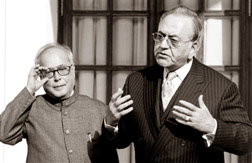|
observer |
|
|
|
|
|
OTHER LINKS |

|

|

|
Pakistan test fires nuclear-capable missile
Pakistan test launched a nuclear-capable medium range missile on Wednesday, two days after South Asian rival India conducted its first trial of a new ballistic intercept system. The Pakistani Hatf 4 or Shaheen-1 missile - Shaheen means "eagle" in Urdu - has a range of 700 kilometers (437 miles) meaning it can hit targets deep inside neighbouring India. "Pakistani troops today conducted a successful launch of the medium range Hatf 4 or Shaheen-1 missile," the military said in a statement. The test came as part of a continuing exercise by Pakistan's Army Strategic Force Command. On November 16 Pakistan test fired a Ghauri missile with a longer range of 1,300 kilometers (812 miles) away. "The event marked the culmination phase of the training exercise and validated the operational readiness of the strategic missile group equipped with Shaheen-1 Missiles," the statement said. Pakistan's Chairman of the Joint Chiefs of Staff General Ehsan Ul Haq witnessed the launch exercise at an undisclosed location. He hailed "the high standards achieved during training which was reflected in the successful launch and the accuracy of the missile in reaching the target," the statement said. "Pakistan can be justifiably proud of its defence capability and the reliability of its nuclear deterrence," he added. Neighbouring India announced on Monday that its first test of a missile designed to intercept other missiles had been a success. The test saw a surface-to-surface Prithvi-II (earth) missile, which has a range up to 250 kilometers (156 miles), shot down over the Bay of Bengal by a similar missile fired seconds later. Regional rivals Pakistan and India have routinely conducted missile tests since carrying out tit-for-tat nuclear detonations in May 1998, alarming the world. Top Indian and Pakistani diplomats at a meeting in New Delhi this month agreed to create a panel to share intelligence on terrorism and move to cut the risk of nuclear weapon "accidents". The talks rekindled a peace process put on hold since July's Mumbai train bombings, in which 189 people died. Indian officials said Pakistan's spy agency was linked to the blasts, a claim Pakistan denied. They also agreed on the "early signing" of an agreement to reduce the risk of "accidents relating to nuclear weapons", without giving a specific time frame. The two sides are to meet next in Islamabad in February. The rival neighbours have fought three wars since independence from Britain in 1947, two of them over the disputed Himalayan territory of Kashmir, which is divided between the two and claimed by both in its entirety. -AFP |








